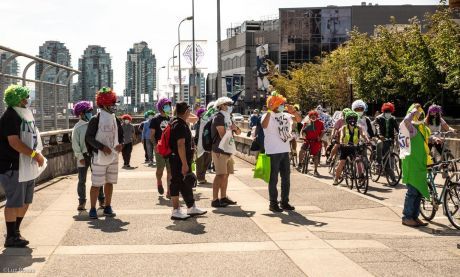News
You are here
Dignity for Migrant Workers

October 17, 2020
The title comes from the name of a non-profit organization based in Vancouver, BC – Dignidad Migrante Society. It came into existence out of necessity and continues to exist because of the continual lack of support from government. They primarily serve Temporary Foreign Farm Workers (TFFW) in the agricultural sector, a typically invisible workforce that makes up a crucial part of the food supply chain in
Canada.
According to StatsCan, in 2017 there were about 550,000 temporary foreign workers (TFW) in Canada, accounting for 15.5% of the employment in agriculture, forestry, fishing, and hunting. Since 1966, the Seasonal Agricultural Worker Program (SAWP) has been one avenue through which TFW have met the seasonal labour needs of Canadian agricultural producers [Government of Canada]. The Covid-19 Pandemic in 2020 created a shortage of workers able to enter Canada and has ultimately exacerbated long-standing problems that these workers face.
Some of the common issues facing TFFW include:
- Inadequate, non-standard housing, with overcrowding and lack of privacy.
- Low wages, with lack of overtime, holiday or vacation pay.
- A wait-period of three months to access provincial health care upon arrival.
- Violations of employment standards, including poor working conditions, abuse, punishment for speaking out, and barriers to exercising rights.
The list goes on, and the multitude of challenges faced by predominantly non-English speaking TFFWs who seek only to be treated fairly and with dignity, has led to the need for organizations like Dignidad Migrante.
Raul Gatica, technical assistant to the worker-run board at Dignidad Migrante, says that although they have received very well-written letters in response to their demands to the Federal and Provincial (BC) governments for increased equity for migrant workers, it mostly amounts to lip-service and no concrete action.
Take for example the overcrowding and unsafe living conditions in Norther Cherries Farm in Kelowna, BC, where 16 workers have been living in less than 300 square feet, without any bedding or places to store clothes, and appliances and kitchen next to the sleeping area. Workers there are prohibited from leaving the farm, under threat of punishment, and instead must be escorted to a single grocery store every two weeks to shop for all their food.
Another example is Sam Enterprises in Abbotsford, BC, where workers can only request food from their employer, who purchases food at more expensive locations, prevents workers from speaking in private and even uses drones to invigilate workers, including throughout the night.
Some of these new restrictions are supposedly in place to prevent the spread of Covid-19, but have been going on in many places for years, with the pandemic being used a pre-text for such appalling abuse of workers’ rights. Though the provincial and federal governments are well aware of these violations, they have done little more than reply with nice letters, befitting of Trudeau’s Liberals. The double-standard of the application of employment standards for Canadian residents but not migrantworkers, is one of the long-standing forms of exploitation that has now been exacerbated in the name of the pandemic.
Of course, solutions to the injustices faced by migrant workers have long existed. Some basic pathways towards justice include:
- Participation of workers in negotiating their contract.
- Open Work Permits, which would allow migrant workers to easily change employers if their rights are violated, rather than the current method that involves lengthy court processes.
- A Pathway to Permanent Residency, which all immigrants should be eligible for, and would ultimately provide the same rights to employment standards, pay, vacation, health care, and the basics of a dignified life, that Canadian residents experience.
Similar to other demands against injustice, these appear radical at first, but upon closer reflection, they demonstrate the basic requirements that all labourers anywhere should have access to.
Organizations like Dignidad have created a network of migrant workers who work with one another in solidarity to teach new workers about their rights and how to seek support. They also hold events, such as the “Ride for Rights”, to highlight to the general public the injustices they face and the support they seek from fellow residents who dearly depend on their work to put food on the table. It is up to all of us to raise awareness and work in solidarity with migrant workers, to ensure that they are treated with the same dignity that we all expect for ourselves.
Section:
Topics:









